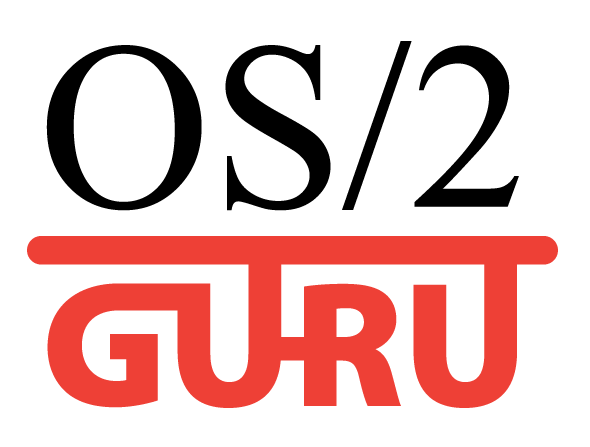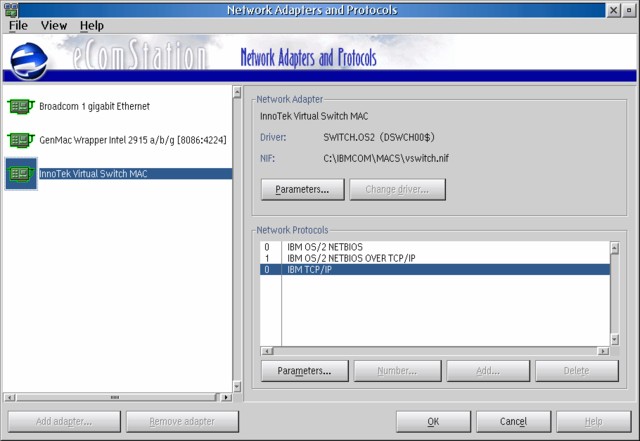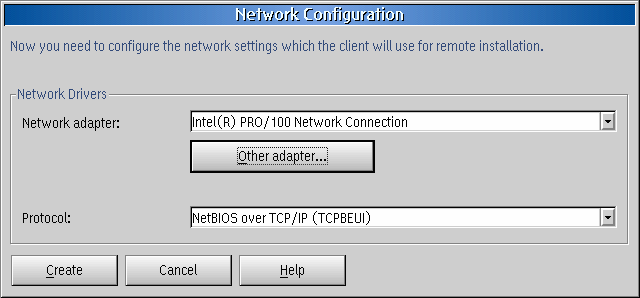OS/2.GURU Library
Reviews / articles about OS/2 eComStation ArcaOS
ArcaOS, eComStation, IBM OS/2 Warp

OS/2.GURU LibraryReviews / articles about OS/2 eComStation ArcaOS |
Operating systems ArcaOS, eComStation, IBM OS/2 Warp |

|

|
|
|
DATE: 2010-07-04 14:24:20 AUTHOR: eCo Software
When did you start to use IBM OS/2 Warp? Why did it attract your attention? I started to play with OS/2 around the fall of 1996.
So I already thought Windows 95 was redundant. When I actually got my first look it, I was completely disgusted. It was clumsy, frustrating, and badly-designed. Even worse, it was patronizing and controlling from top to bottom. I promised myself I would never, ever use it on any computer of mine. As far as a successor to DOS was concerned, OS/2 had come along first, and was better by almost every measure I'd heard. So I decided to try it out when I got the chance. At the time, I was a computer science major in university. I didn't have the budget for OS/2, even if any local store had sold it. At the same time (early 1996), Linux was starting to take off. I had to use Linux in my course work, and after a while I installed a copy onto a spare partition on my 486 PC. Linux was great for programming and learning, but I still wanted something I could use comfortably for day-to-day work and play. And DOS was getting pretty long in the tooth by this point. Meanwhile, a friend of mine from back home got OS/2 Warp 4, and showed it off to me during vacation. That fall, I took a part-time job in the university computing services department. One of my co-workers happened to have a copy of OS/2 Warp 3 which he'd won some years ago in a trade show, and had no use for. So he gave it to me, and I installed it on my increasingly-crowded PC (alongside both DOS and Linux). I have to confess, I didn't exactly fall in love at first sight. The Workplace Shell was completely alien to me, and I found many parts of the system confusing. For the next year or so, I ran both OS/2 and Linux side by side on my computer, and in actual fact I probably used Linux more. Still, the more I used OS/2, the more I came to like it. After I finished university, my knowledge of OS/2 got me a job as (basically) an assistant network administrator/support technician for an large insurance company's OS/2 LAN Server network. My knowledge of (and comfort with) OS/2 grew exponentially during that time. Also, as time went by, I gradually became more and more disillusioned with Linux. It was still a great system for servers, developers, and enthusiasts. But I realized it was far too fragmented and disorganized (both technically and philosophically) to move effectively into the consumer space. I also didn't like some of the specific ways in which it was trying to popularize itself. I finally bought a copy of Warp 4 in 1998, installed it on my new (P-II) PC, and was a whole-hearted OS/2 user from that point onward. How do you use eComStation? Which applications do you recommend? Well, for Internet use, I guess the programs I use most often are SeaMonkey for web browsing and IRC, PMMail for e-mail, and ProNews/2 for newsgroups. For graphics, I use the GIMP (in combination with HobLink X11), as well as PMView Pro for viewing/managing images and Cameraderie for getting photos off my digital camera. I don't have to work with formatted documents much these days (I don't require it for my job at the moment), but when I do, OpenOffice.org is great. For programming, I mostly use the great MED text editor (formerly known as Mr. ED). Other programs I find indispensible include NetDrive, Character Map/2, eAccounts for managing passwords and similar things, and (since it became available in the last few months), QBitTorrent. How to increase the population of eComStation users today? Well, first of all I know Mensys wants to get an updated DemoCD for eComStation 2.0 released. That should help a lot. It's a fair bit of work, though, and they're pretty busy these days... Other than that, we need two things: GUI improvements and applications. I already mentioned where I think we need to focus our development on those fronts. Working on to replacing some of the old and aggravating configuration tools included with eComStation would also be a big help. MPTS, for example, is a constant source of headaches. And, we need to improve our interoperability with other networked systems and devices. Getting Samba improved is important; the same goes for CUPS. Even if you're not a developer, you can help test or provide feedback. Nothing kills a project faster than a lack of feedback from users! What to add to eComStation to make it "sexy"? New PM controls or some friendly applications? We're not doing too badly for applications these days, actually. If there's one major gap, it's good support for mobile devices like the iPod and BlackBerry and their relatives. I don't know exactly where the future of computing lies, but I'm pretty sure that mobile devices are going to figure prominently in it. But the biggest thing I want to see are some more modern and capable PM controls. Environments like QT are fine, but you have to write the entire program in them from the start. We need good PM controls to modernize existing applications, as well as to appeal to programmers who are comfortable with PM. The biggest thing we need on that front is a modern MLE control which supports Unicode (and possibly some level of rich text formatting as well), which could be dropped into existing applications like PMMail or AE without much difficulty. Number two on the list (for me personally) would be a more intelligent container control with fully-resizable columns (something like what ProNews uses, although more general-purpose). What are you developing for eComStation now? Various different things. I'm responsible for maintaining several system components, and I'm continually working to improve them. That takes up a lot of my time. I also continue to work on the various applications I've written which aren't specifically part of eComStation. I'm continuing to develop my fonts, in particular Workplace Sans (I hope to have a new release ready fairly soon). If you want to know about new projects specific to eComStation which I'm working on... I have a few ideas that I'm playing around with, but they're nowhere close to being ready yet. (And I can't actually guarantee that they ever will be.) For instance, I mentioned the old, archaic MPTS configuration GUI. I'm currently looking at ways to replace it with something a bit friendlier and more maintainable. I've put a reasonably functional prototype together, although if I ever develop it into a finished product it won't necessarily look like what I have now.

I also want to write a new tool for booting the eComStation install CD remotely over the network. This is based on something that I actually had working (and on the BetaZone) for eCS 1.2 English, although it's being quite radically redesigned.

Is it possible make eComStation switch languages without re-installing the system? Well, not totally. In theory, if we could isolate all the language- specific resources and message files, it might be possible to switch at least the desktop (PM+WPS) language by replacing the resources. A kind of "super Dialog Enhancer", if you like. It would be quite a lot of work to implement such a thing, though. And it would only work for SBCS languages. For DBCS languages, in addition to the above, you would need to replace some very low-level system files and do a lot of very complex reconfiguration. It may not be technically impossible -- very little is actually impossible, if you have the time, the skills, and the resources -- but personally, I can't see it happening. How to improve the situation with fonts in eComStation? Well, there are more applications these days which use the FreeType library instead of native OS/2 functions for drawing text. This provides very attractive anti-aliased fonts. The disadvantage is that each application has to support it specifically (unless you use a special environment like QT4). I've also been looking recently at updating the old FreeType/2 installable font driver for Presentation Manager. I've just released new version which improves the Unicode support and also makes the use of DBCS fonts a little easier. But this version is still based on the same version (1.3) of the FreeType library. What I want to do next is write a new version based on FreeType version 2. If done right, that could bring us OpenType font support, as well as improved rendering for Type 1 fonts. None of this, unfortunately, makes antialiased text possible under Presentation Manager, but it certainly broadens our options. As far as creating new fonts goes... it's still true that you need some pretty specialized tools to do this. I use a commercial product called FontLab TypeTool, which is flexible and easy to use. Unfortunately, it has its limitations, chief among which is very limited support for hinting. The main open source product for font design is FontForge, which is extremely powerful. I actually took a look at porting it to OS/2, once. The underlying engine actually compiles on OS/2 quite easily, but the GUI is more of a problem. Unfortunately, it doesn't use a ported library like QT, but relies on its own custom widget set which runs on X11. Porting it to OS/2 might be possible by linking against the XFree86 libraries, but that would mean running the program under an X server (the way we have to do with The GIMP). It's actually quite easy to create a font, given the tools. Creating a GOOD font is something else entirely. The more I study this topic, the more I realize just how little I understand. How to start development of applications for eCS? Which resources and documents do you recommend for novice developers? That's a tricky question, because I've never really found a satisfactory answer for myself. I did my early learning with Blake Watson's "OS/2 Warp Programming for Dummies", which got me started, but in retrospect it's pretty limited. Since then, I've mostly just relied on the documentation in the IBM toolkit... and a lot of experimentation. I know a lot of people swear by Charles Petzold, but I've never been able to find any of his books (they're long out of print at this point) so I can't say what they're like. It doesn't help that I'm not actually a very good programmer. My areas of interest in university were collaborative development and user interface design... not so much actual programming. That's why most of the programs I write tend to be simple, single-task utilities... that's what I know how to do. So I guess my advice for novice developers would be: start with what you know. Then try to extend it little by little by playing around. There are lots of useful things you can do that don't require a huge amount of skill or effort. Just use your imagination. ;) It seems that you like japanese culture. Tell us, what did you find in this culture during this year?
Additional information:
Kommentare:
|
|
|||||||||||||||||||||||||||||
|
ArcaOS 5.1.1 whatsnew - PNG iconsPNG icons on Desktop PNG icons on Desktop. (instead of ancient .ico designed in 1994) |

ACPI driver |
// надо на ENG!!
Buy eSchemes |
| Every conference is important. |
Warpstock Europe 2016
Interview with Lars Erdmann
What was happening at that conference? The work on ArcaOS was starting.. |
